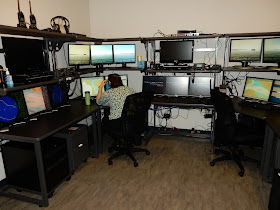Are we over thinking it?
This leads to the questions below:
Just when school was over for the quarter, my friend Captain James Wright sent me an inspiring email. One of those writings that make me think! He posed some interesting questions on automation, and as always sparked the brain cells.
Backstory: Last year, around this busy time of year, I visited the Pacific Maritime Instituted. PMI. My plan was to do an incredible write up on this training center. There were many things the airline industry could learn from how they train harbor pilots. However, life got away and time flew as I jumped into my first year of school. But the photos PMI, speak volumes.
Jim says:
PMI is about to put on a series of Bridge Resource
Management classes for Crowley Maritime tug masters and mates working
out of Valdez. The simulator exercises are modified based on the
previous classes experiences.
The latest modification is aimed at
“automation dependency”. The purpose of this exercise is for the bridge
team to develop a comfort level with transitioning from a “glass
bridge” to a WW-II type non-automated bridge. A similar comparison in
aviation might be transitioning from a 787 – Dreamliner cockpit to the “The Spirit of St. Louis”.
The
modifications include a full electronics failure (including radar)
leaving the bridge team with only hand steering, basic engine control
and a magnetic compass. The bridge team will then be required to make
decisions to balance safety and efficiency using the available controls
and equipment to either complete or abort the exercise.
Since
my age group mostly learned our profession in WWII type ships we tend
to think that the transition described above should not be a problem.
Evaluations of pilots, masters and mates at PMI suggest the opposite;
that mariners from the “automation-era” might find transitioning “back
to the basics” somewhat uncomfortable.
This leads to the questions below:
- Do traditional pilotage / ship-handling (hand flying) skills add value to our profession in the “age of automation”?
- If so, is there a reasonable expectation that traditional pilotage / ship-handling (aviation) skills can be passed on to pilots in “the automation generation”?
- If so, what solutions in addition to the above type of exercise might best accomplish this goal?
- Alternatively, are we overthinking the “automation” problem?
My Dissertation is moving toward
the automation challenge.
Do I think there is a problem?
Perhaps when I read articles that state:
The answer is in the results.
What do you think?
Enjoy the Journey!!
XOX Karlene







Hi Karlene,
ReplyDeleteI completely agree. Automation is not making us better pilots.
My analogy is this. I am less spatially aware of where I am, how I’m getting there, and where precisely I’m going when I use my smart phone or my car’s nav tech for guidance. Compared to using a map were I actually have to engage my brain to keep track of where I am, the turns to make, and where my destination is, with the advanced tech I just follow the steering and eventually I get there—no brain engagement necessary. Automation does the same with piloting—brain engagement is less necessary.
While I’m not suggesting the tech in general doesn’t allow me to do things I otherwise couldn’t, this tech does not help prepare me for those 1% times when the stuff doesn’t work. Also, when it doesn’t work I could totally be led down the primrose path fat dumb and happy—which probably is what’s going on in cockpits when the stuff doesn’t work right.
My personal view-point is pilot training and preparation should not be easier because of cockpit automation. It should be harder, emphasizing unpredictability. My view is the training goal for pilots using automated systems is for them to be able to quickly synthesize seemingly in-coherent information from multiple sources so they can quickly address unexpected and potentially archaic situations. That is a pretty high training level which I’m not so sure people are willing to embrace.
Cheers
Tom
Tom, Thank you!!! This is the essence of what has happened... automation and resulting train-to-proficiency with reduced programs because of the automation... is backwards. We should have more training because of the automation. And the brain engagement is exactly the issue.
DeleteThe best way for anyone to understand is being the passenger or driving. If you're a passenger, you don't remember how you got there. If you're driving and paying attention, you do. (unless you depend on the GPS providing directions)...
How do we get people to engage their brains? Not sure. Thank you so much for the great comment!
FLIGHT DECK. LATE NIGHT.
ReplyDeleteCAPT ABBOTT
Do you think we're overthinking the "automation"
problem?
F/O COSTELLO
Ahh... can I get back to you on that?
Say... how come the simulator is used to
practise flying without automation?
CAPT ABBOTT
Well... how else could they do it?
F/O COSTELLO
Gliders! You could go up with a licensed Gliding
Instructor - get the feel for NATURAL flying,
without actually going for your GLIDER license.
CAPT ABBOTT
That's scary...
F/O COSTELLO
What?
CAPT ABBOTT
You're starting to make sense to me.
FADE